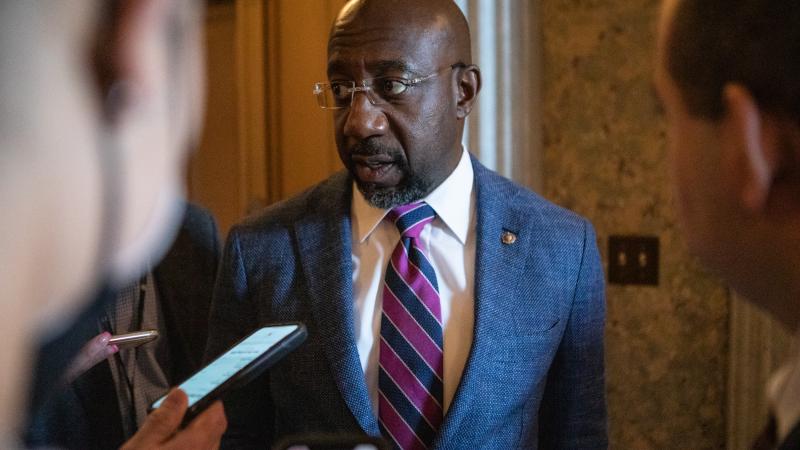FISA renewal deadline fast approaching amid bipartisan call for ending warrantless surveillance
The deadline to reauthorize FISA is April 19. Both sides of the aisle are raising serious privacy concerns.
The Foreign Intelligence Surveillance Act (FISA) renewal deadline is fast approaching as conservative lawmakers and some Democrats continue their push for ending warrantless surveillance.
Lawmakers on both sides of the aisle, including conservative and progressive legislators, have called for reforming section 702 of FISA ahead of the April 19 deadline.
According to the Office of the Director of National Intelligence, Section 702 is a "key provision of the FISA Amendments Act of 2008 that permits the government to conduct targeted surveillance of foreign persons located outside the United States, with the compelled assistance of electronic communication service providers, to acquire foreign intelligence information."
The April 19 extension was tied to the National Defense Authorization Act that passed last year. There were two competing FISA reform proposals being considered in February. The Judiciary Committee version would have required law enforcement to obtain a warrant for surveillance while the other bill from the House Intelligence Committee did not include such a rule.
The House floor vote was ultimately delayed. A new bipartisan bill was introduced in the Senate on March 14 that would end warrantless surveillance.
Supporters of the House Intelligence Committee bill who oppose a warrant requirement have argued that law enforcement should not be required to obtain a warrant, given that it takes time in cases involving national security. The White House has formally supported renewing section 702.
"The Biden-Harris Administration strongly supports the reauthorization by Congress of Section 702 of the Foreign Intelligence Surveillance Act (FISA), a vital intelligence collection authority, which the Attorney General and the Director of National Intelligence conveyed today in a joint letter to congressional leadership. Section 702 has proven a cornerstone of U.S. national security," said National Security Advisor Jake Sullivan in a statement last year.
"This authority is an invaluable tool that continues to protect Americans every day and is crucial to ensuring that U.S. defense, intelligence, and law enforcement agencies can respond to threats from the People’s Republic of China, Russia, nefarious cyber actors, terrorists, and those who seek to harm our critical infrastructure."
Sullivan also said the White House agrees with the President’s Intelligence Advisory Board (PIAB) report that FISA should be renewed "without new and operationally damaging restrictions on reviewing intelligence lawfully collected by the government and with measures that build on proven reforms to enhance compliance and oversight, among other improvements."
Senate Majority Whip Dick Durbin, D-Ill., chair of the Senate Judiciary Committee, and Sen. Mike Lee, R-Utah, the main sponsors of the new bill, have rejected that argument.
“The documented abuses under FISA should provoke outrage from anyone who values the Fourth Amendment Rights of American citizens,” Lee said in a statement. “From warrantless searches targeting journalists, political commentators, and campaign donors to monitoring sitting members of Congress, these actions reveal a blatant disregard for individual liberties."
Durbin said section 702 is a "valuable national security tool" but it needs reform. "While only foreigners overseas may be targeted, the program sweeps in massive amounts of Americans’ communications, which may be searched without a warrant," said Durbin in a statement. "Even after implementing compliance measures, the FBI still conducted more than 200,000 warrantless searches of Americans’ communications in just one year—more than 500 warrantless searches per day."
Rep. Jim Jordan, chairman of the House Judiciary Committee, predicted that some sort of reform to FISA would be enacted this year.
"We'll get some reform, I think, but the key is, will we get the big reform, which is the warrant requirement, which is what we've been pushing for, members of the Judiciary Committee?" Jordan said on the "Just the News, No Noise" TV program on Tuesday. "We had a strong bipartisan vote come out of committee that had the warrant requirement in there."
Jordan argued that a federal law enforcement agency like the FBI should be required to obtain warrant from a court, viewing it as a privacy and civil liberties issue.
"We've even said it can be the FISA court, but there needs to be a warrant requirement and that's the hang up right now. There are lots of members who are nervous about that," he said. "But there's a bunch of members who know that it's the right thing to do and let's hope that it gets into final legislation. That's what we're pushing for and if that gets in, I think it's a reform worth voting for. If it doesn't, I think it's probably not."
A GOP congressional source familiar with the FISA reform deliberations told Just the News on Tuesday that House Speaker Mike Johnson, R-La., hasn’t yet unveiled how he plans to handle FISA yet but the caucus is supporting the House Judiciary Committee's legislation that would impose a warrant requirement.














